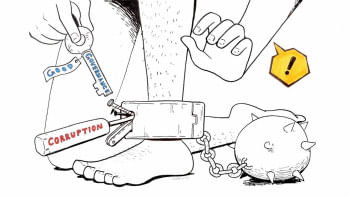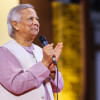Our anti-corruption capacity is hostage to power

Two parallel events taking place in the last week of February raised a red flag, showing how the anti-corruption capacity of relevant state institutions are becoming increasingly hostage to the criminalisation of politically acquired power. One is the outrageous political rehabilitation of some "leaders" of a youth front of the ruling party who were "ousted" in 2019 following a much-hyped anti-corruption drive against casino business and related corruption offences. They did not face any notable predicament on their way to the resumption of their temporarily lost positions. On the contrary, they were visibly welcomed back, reaffirming the reality that such agents are indispensable for the agenda of the powers that be, including the monopolistic control of the political space.
By the same token, this turn of events further ridiculed the high-profile anti-corruption drive, while dealing a lethal blow to the legal process of justice as well as accountability against corruption.
In the second event, coincidental as it may seem to casual observers, an equally outrageous threat was issued publicly against our already fragile anti-corruption infrastructure by a "member of parliament" and leader of a political party belonging to the ruling alliance. In some unspeakable terms, the Anti-Corruption Commission (ACC) was warned that it would be "excoriated" for lodging a corruption case against a couple of his sons. Instead of taking the due legal course to defend his sons, the lawmaker not only shamelessly resorted to law-breaking, but also abused his politically acquired power to undermine the pledge of "zero tolerance against corruption" pronounced frequently by the head of the government and top leader of the ruling alliance.
As shocking as such evidence of criminalisation of politics is, it is hardly surprising. Positions of power acquired through various means, including financial, governmental, and above all political, sometimes real but often also manipulated, have long been allowed to be treated as a licence for self-enrichment through various illicit means, irrespective of whichever party is in power. Over the years, this licence has been blessed, protected and promoted by beneficiaries among power-holders and duty-bearers in political, business, administrative, law enforcement and related institutional infrastructures. Such abuse of power has enjoyed protection and impunity, and has been converted into an inseparable aspect of governance and political culture. That the state's anti-corruption agenda and capacity would become hostage to criminalised political power is a natural outcome of that process.
The 2019 anti-corruption drive, which raised many expectations, started off targeting some ruling party-affiliated "student and youth leaders," procurement lords and kingpins of casinos – with the prime minister's blessing. She made three important announcements: a zero-tolerance policy against corruption; that nobody will be spared; and that the powerbase of the ruling authority will be cleansed first.
As shocking as such evidence of criminalisation of politics is, it is hardly surprising. Positions of power acquired through various means, including financial, governmental, and above all political, sometimes real but often also manipulated, have long been allowed to be treated as a licence for self-enrichment through various illicit means, irrespective of whichever party is in power. Over the years, this licence has been blessed, protected and promoted by beneficiaries among power-holders and duty-bearers in political, business, administrative, law enforcement and related institutional infrastructures.
But there was always the possibility that the drive was going to be an eyewash not merely because those directly targeted by the drive were just the front-liners, but also because they represented only the tip of the iceberg. The strategic importance and role of such cadres for the zero-sum game of politics was never in doubt, nor did it need rocket science to understand that their peers and cohorts are already spread all around and have captured every aspect of life. Their role models, colluders and protectors are within the power structure and sustain the supply chain of the worrisome deepening and widening of corruption in the name of political affiliation.
Another dimension of the abuse of politically linked power is the ever-increasing criminality of student politics, as manifested through endless examples of unlimited expertise of the dominant sections of today's "student leaders" in all conceivable categories of power abuse and relevant illegal activities. The series of appalling crime stories like the brutal killing of Buet student Abrar Fahad and the brazen harassment of Phulpori Khatun at the Islamic University in Kushtia has been systematically exposing the normalisation of criminalised politics, with academic institutions as training grounds.
The range of illegality around the casino scandal, public procurement and other forms of abuse of politically linked power, as then exposed by the drive, were scandalous – though not surprising. It is no secret that the casino business flourished under the knowledge and participation of a section of local political leaders and "public representatives," while it also thrived before the eyes of local administration and law enforcement officials, some of whom were allegedly among beneficiaries. A further question remains about the role of the relevant authorities, whose job was to ensure compliance in importing and deploying the various state-of-the-art materials, equipment and foreign staff.
It was never in doubt, therefore, that if the process of investigations for accountability was robust enough, it could open a Pandora's box which the system is far from capable of handling. The same is true of the numerous networks of corruption syndicates in public procurement and supply at various levels, which are the source of filthy enrichment of the politically connected in collusion with a section of public officials involved in a win-win game. No less catalytic is the politicised dysfunctionality of the relevant institutions.
In this context, the meaningful delivery of anti-corruption actions demands a paradigm change in our political culture, focusing on a rediscovery of values and practices of political parties and their affiliated entities. As unlikely as it may appear in the abiding context, consistent with the pledge to start off by cleaning their own houses, the political leaders must face the mirror and find ways to transform their parties into genuine political institutions capable of serving public interests. Equally important is the task of depoliticising the institutions.
In the absence of any real progress in these directions, there is no magic bullet that can hold the power to account and meaningfully control the cancer of corruption, nor is there any prospect of saving the aspirations of our democratic future from being doomed.
Dr Iftekharuzzaman is the executive director of Transparency International Bangladesh (TIB).

 For all latest news, follow The Daily Star's Google News channel.
For all latest news, follow The Daily Star's Google News channel. 










Comments